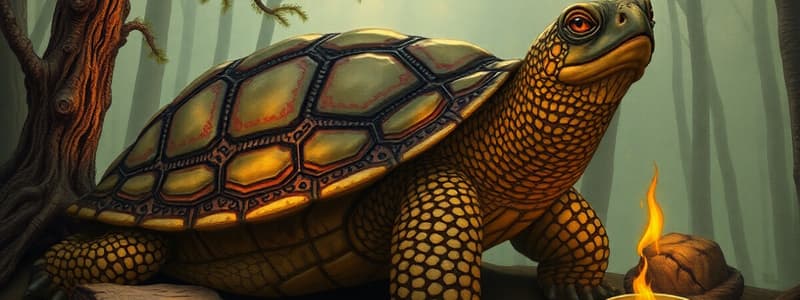Podcast
Questions and Answers
What is the main concern expressed at the beginning of the passage regarding living differently in contemporary America?
What is the main concern expressed at the beginning of the passage regarding living differently in contemporary America?
- That being different requires constant defense against societal pressures.
- That people who are different will inevitably be isolated and lonely.
- That those who are different must relocate to find like-minded individuals.
- That standing out leads to unwanted attention and the loss of one's unique identity. (correct)
What does the narrator's interaction with the snapping turtle primarily symbolize?
What does the narrator's interaction with the snapping turtle primarily symbolize?
- The narrator's struggle to capture and control elements of the wild. (correct)
- The narrator's respect for the ancient wisdom embodied by wild creatures.
- The narrator's ability to overcome natural obstacles through persistence.
- The narrator's deep connection with the natural world and its challenges.
What is the significance of Mr. Jacket's arrival and participation in preparing the turtle soup?
What is the significance of Mr. Jacket's arrival and participation in preparing the turtle soup?
- It highlights the narrator's growing desire for companionship and social interaction.
- It represents the intrusion of modern society into the narrator's solitary life.
- It symbolizes a merging of traditional and contemporary lifestyles. (correct)
- It demonstrates the narrator's ability to influence others and convert them to his lifestyle.
Why did the narrator use hickory salt and Solomon's-seal tubers in the turtle soup?
Why did the narrator use hickory salt and Solomon's-seal tubers in the turtle soup?
What does the narrator's invitation to Mr. Jacket to 'stay and eat it and spend the night' suggest about the narrator's character?
What does the narrator's invitation to Mr. Jacket to 'stay and eat it and spend the night' suggest about the narrator's character?
What is the most likely reason Mr. Jacket's visit is compared to 'after school on Third Avenue'?
What is the most likely reason Mr. Jacket's visit is compared to 'after school on Third Avenue'?
Given the context of the passage, why does Mr. Jacket need to return home to tell his mother before staying the night?
Given the context of the passage, why does Mr. Jacket need to return home to tell his mother before staying the night?
What does flying Frightful after preparing the turtle suggest about the relationship between the narrator, the wild, and socialization?
What does flying Frightful after preparing the turtle suggest about the relationship between the narrator, the wild, and socialization?
What does the narrator's act of drawing a line through Tom's stories and observations about nature signify?
What does the narrator's act of drawing a line through Tom's stories and observations about nature signify?
How does the narrator's perspective on her wilderness experience change after Tom's visits?
How does the narrator's perspective on her wilderness experience change after Tom's visits?
What is the most likely reason Aaron doesn't ask the narrator about her life on the mountain?
What is the most likely reason Aaron doesn't ask the narrator about her life on the mountain?
The narrator's statement, "I seem to have an address now," suggests that she is realizing what?
The narrator's statement, "I seem to have an address now," suggests that she is realizing what?
What does the laundry chute represent to the narrator at the end of the passage?
What does the laundry chute represent to the narrator at the end of the passage?
How does Bando's reaction to the narrator's comment about the laundry chute reveal his feelings?
How does Bando's reaction to the narrator's comment about the laundry chute reveal his feelings?
The catbird's behavior near the fireplace suggests what about Frightful's presence?
The catbird's behavior near the fireplace suggests what about Frightful's presence?
What does the phrase "guest tree" imply about the narrator's lifestyle?
What does the phrase "guest tree" imply about the narrator's lifestyle?
Flashcards
Bando
Bando
The narrator's friend, a teacher who helped build a guest house.
Mr. Jacket (Tom Sidler)
Mr. Jacket (Tom Sidler)
An acquaintance of the narrator, who is curious about his lifestyle.
Snapping Turtle
Snapping Turtle
A large turtle the narrator tries to catch.
Frightful
Frightful
Signup and view all the flashcards
Making a Noose
Making a Noose
Signup and view all the flashcards
Solomon’s-seal Tubers
Solomon’s-seal Tubers
Signup and view all the flashcards
Mashed Up Nuts
Mashed Up Nuts
Signup and view all the flashcards
Orris Root
Orris Root
Signup and view all the flashcards
Tom
Tom
Signup and view all the flashcards
Feeling of knowing people in town
Feeling of knowing people in town
Signup and view all the flashcards
Aaron
Aaron
Signup and view all the flashcards
Having an address
Having an address
Signup and view all the flashcards
Laundry chute
Laundry chute
Signup and view all the flashcards
Bring shirt and blue jeans
Bring shirt and blue jeans
Signup and view all the flashcards
Study Notes
- One character observes that being different in America inevitably leads to attention and potential loss of that difference.
- The narrator shares an update about the owls nesting.
- Matt has returned to school, and Bando continued to help burn out a tree.
- Mr. Jacket finds the narrator.
- The narrator is trying to catch a snapping turtle from a raft.
- Frightful alerts the narrator to the presence of people, specifically Mr. Jacket.
- The narrator identifies Mr. Jacket as Tom Sidler after they catch and clean the turtle.
- Tom helps the narrator prepare turtle soup.
- The soup includes onions, hickory salt, Solomon’s-seal tubers and mashed nuts to thicken it.
- Tom stays overnight in the guest tree.
- Tom begins visiting the narrator often on weekends.
- The narrator learns about Tom's life, including his bowling team and friends.
- The narrator feels that this exposure diminishes wilderness experience.
- Tom and a friend went into an empty house, slid down the laundry chute when the real-estate man came in
- The narrator notes that the Baron Weasel has seemingly abandoned their den.
- A catbird is nesting nearby.
- The narrator goes to the library and borrows four books.
- Aaron returns and visits for a week, making willow whistles.
- Aaron doesn't question the narrator's life on the mountain
- Bando visits more often after getting a car.
- The narrator acknowledges being known.
- The narrator anticipates returning to town.
- The narrator jokes about sliding down a laundry chute with Tom.
- Bando is pensive and doesn't play the willow whistle.
Studying That Suits You
Use AI to generate personalized quizzes and flashcards to suit your learning preferences.
Description
In Chapter 19, the narrator deals with the challenges of maintaining his solitary lifestyle as his presence attracts attention. Encounters with figures like Mr. Jacket, later identified as Tom Sidler, lead to interactions that, while enriching in some ways, also threaten the narrator's wilderness experience.




